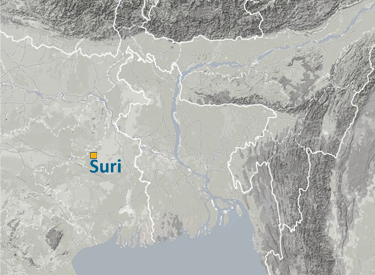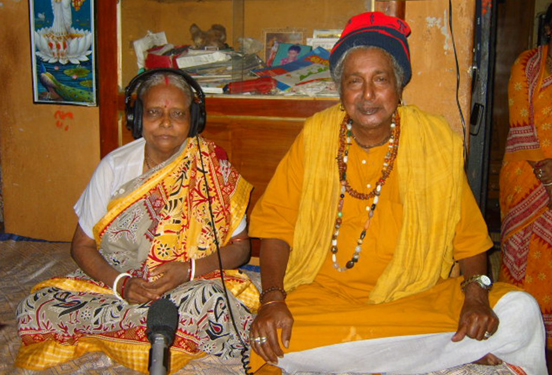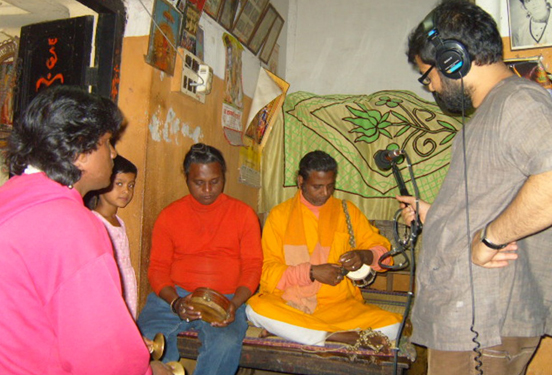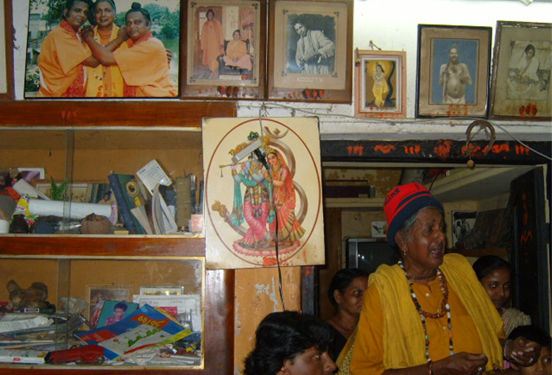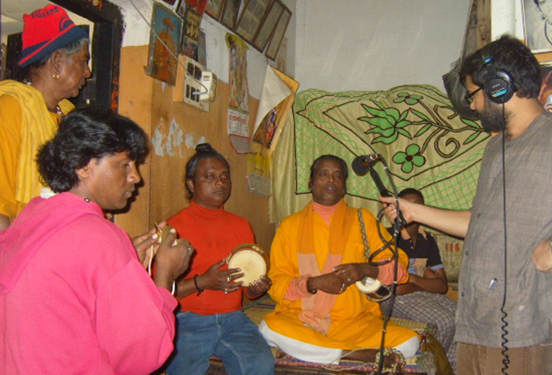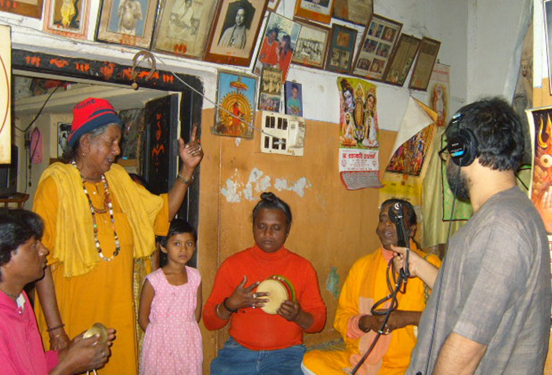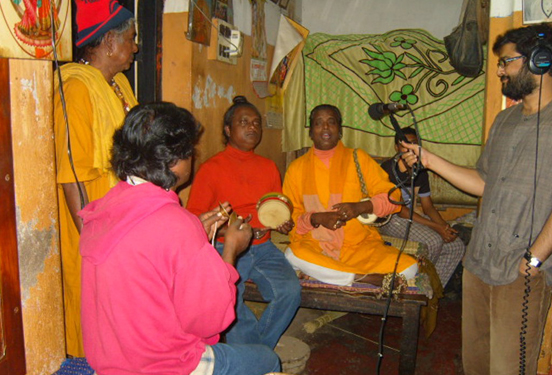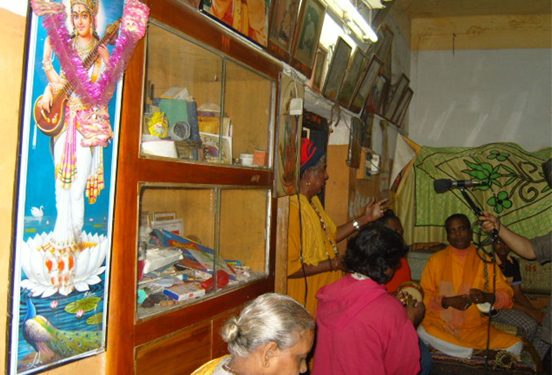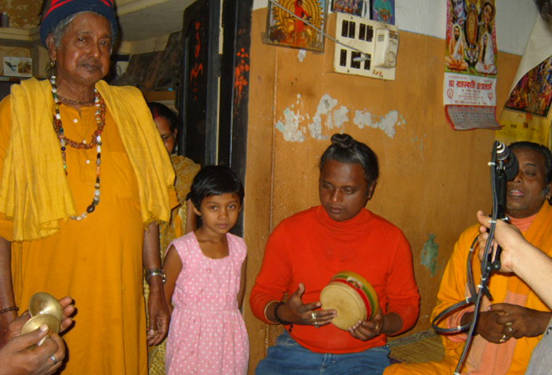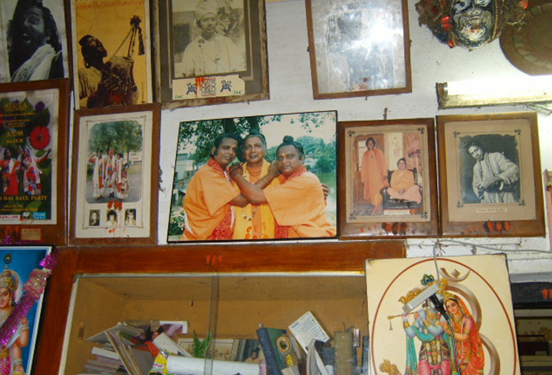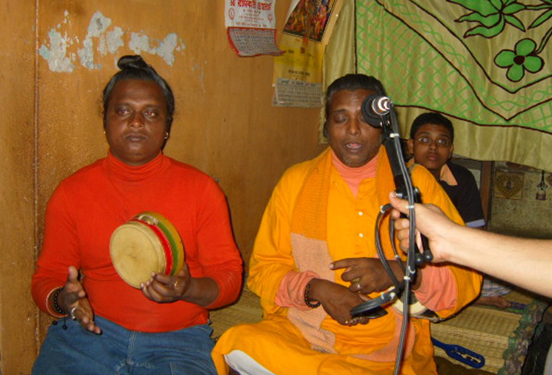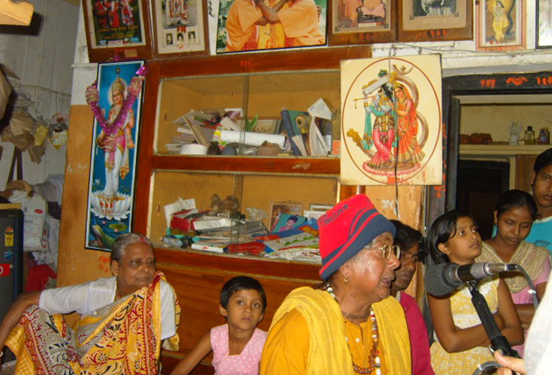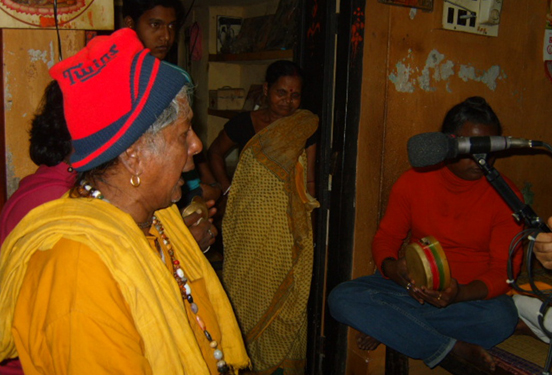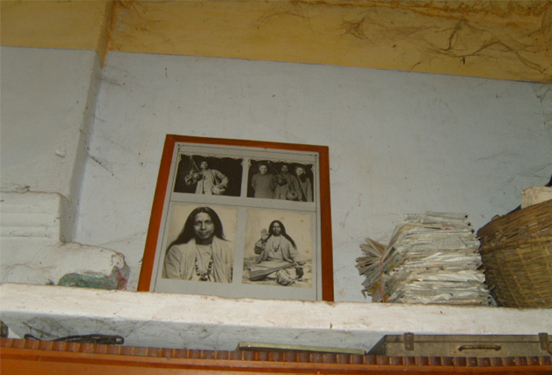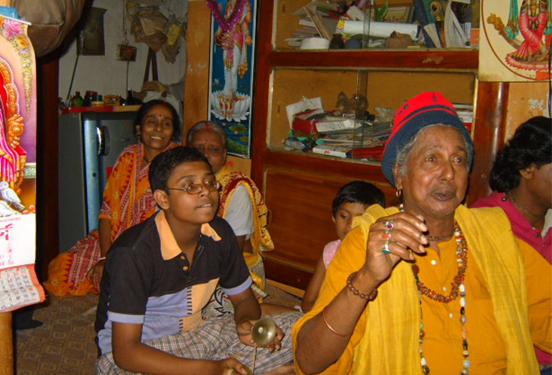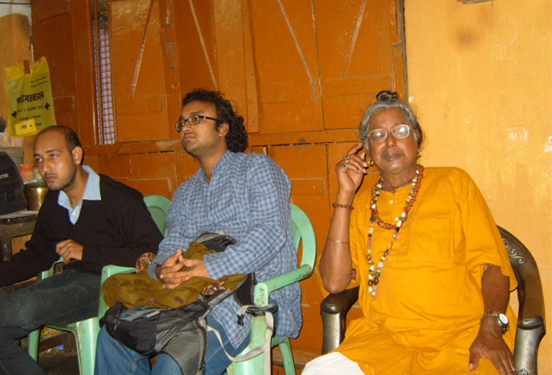Suri. Birbhum. 18 November 2009. Lakshman Das Baul
It is strange to write a session note more than a decade after a field recording trip, to recall details of an experience of 2009 in 2020. Now, it is the recording that has to take us back to that day, also the photos and recordings from days before and after the session. That is all we have with us, there aren’t any other field notes, as I am not in the habit of keeping a diary. This in fact is the diary we keep. We also have our individual and collective memories, and we tap into those.
I am trying to remember if there was a specific reason for us to go to meet Lakshman Das Baul (also written as Luxman and Laksman in various sleeve-notes and books, sometimes also enhanced with diacritics, while we pronounce the name more as Lokkhon), in his home in Suri on 18 November 2009. We were four of us; besides Sukanta and me, there was our friend, musician Satyaki Banerjee and Biplab Ghosh, a poet. We went in the evening, it was about 7 pm when these recordings were made. Before going to him, we went to meet Abani Biswas of Milon Mela, The Sources’ Research theatre project (https://digilander.libero.it/milonmela/), built on the ideas of Jerzy Grotowski’s Theatre of Sources. And, before going to Abani, we had gone in the morning to meet Gour Khepa (the Gour Khepa session notes and recordings can be accessed here https://www.thetravellingarchive.org/record-session/bolpur-birbhum-18-november-2009-gour-khepa/).
So, I try to go backwards, looking for the ‘source’.
In 2009, several years into our field recording, our own folk festival in Shaktigarh, Jadavpur, the Baul Fakir Utsav having quickly grown from seed to quite a big tree in the past four years while we were preparing for its fifth edition in January 2010, with Deepak Majumdar, Georges Luneau and Ruchir Joshi in circulation amongst us, this trip to Gour, and then to Grotowski via Abani, and then taking one step back in time, to Lakshman Das, must have been our own attempt at tracing the course of a journey, albeit backwards.
And now when I am writing this note, we are in the process of going further back from the brothers Lakshman Das Baul and Purno Das Baul, to their father, Nabani Das Baul, via Deben Bhattacharya, Albert and Sally Grossman and Allen Ginsberg, having discovered in the archives of the British Library. a recording of Nabani Das Baul in performance in 1956, made by none other than Arnold Bake.
I am never comfortable writing about baul matters, because I feel utterly confused by its anthropology, sociology as well as baul as a form of performing art. There are many scholars to write about such things. I think that at The Travelling Archive, we are drawn to the power and beauty of this music, and we are also interested in the stories which come out of the lives of those who sing this poetry which is layered with meaning. In 1967, Purno Das Baul, Lakshman Das Baul, Sudhananda Das Baul, Hare Krishna Das, Jiban Krishna Mondal and one curious non-baul by the name of Asoke Fakir (who is a central character in Deborah Baker’s book A Blue Hand: The Beats in India, had gone on a US tour. Our conversation with Lakshman Das Baul starts from there.
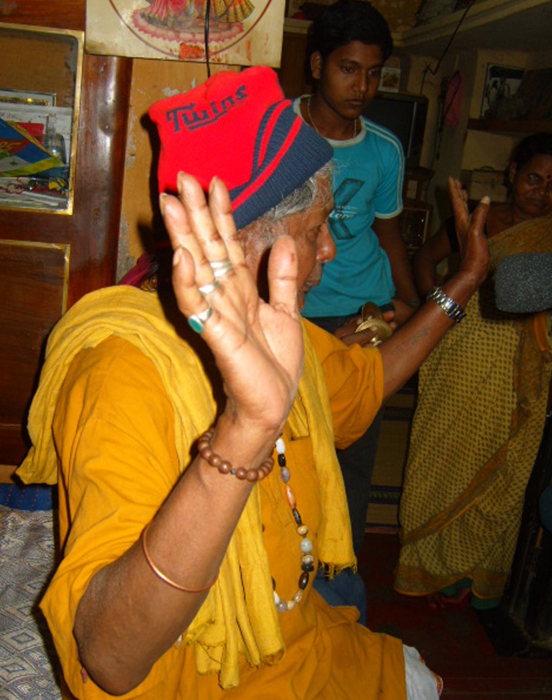
Lakshman Das Baul in his home, Suri, Birbhum
‘Like Purno, Laksman has fond memories of America and is proud of having been asked to go there,’ writes Charles Capwell in Sailing on the Sea of Love: The Music of the Bauls of Bengal, a pioneering study on the songs of the bauls, first published in 1986 and then from Seagull Books in 2011. ‘On his mailbox,’ Capwell continues, ‘in the manner of Indian gentlemen of the last century who had been to the UK to study, he has written “Laksman Das Baul, U.S. Returned.” Laksman’s impressions of America can be summed up in his statement that the gods and great beings who once inhabited India have been reincarnated in America.’
When we met Lakshman Das Baul, he still remembered things, but he had also forgotten details and was getting confused; perhaps he did not care so much to remember either. His home in Suri was filled with people and things, hence also with time. The US trip had receded to the background, now his sons Sukdeb and Mahadeb were carrying on with the singing, but they were not the shining stars of this time, hence there was a sense of fading out of the light.
Thousands of songs, he said, thousands of songs. I got from my father and I am leaving with my sons. And so many places, where to begin to tell the story? I had bought a pair a shoes from Kalighat, and walked for a few days in them to prepare to go. They took us to San Francisco instead of New York, so we stayed there and also played some gigs. Albert Grossman, the producer of our tour, had arranged it all. But my feet were covered in blisters and they hurt very badly. Sally looked after me. I could not perform, but had to have an operation. Then when we came to Bearsville, not far from Bob Dylan’s house, Sally would stock our kitchen with food, and if there were things left over from two or three days, she would throw everything and get new supplies. There were apples in the garden. So many apples. I would cook chicken with apples instead of potatoes. Dylan loved my cooking. He would keep coming back for the food.
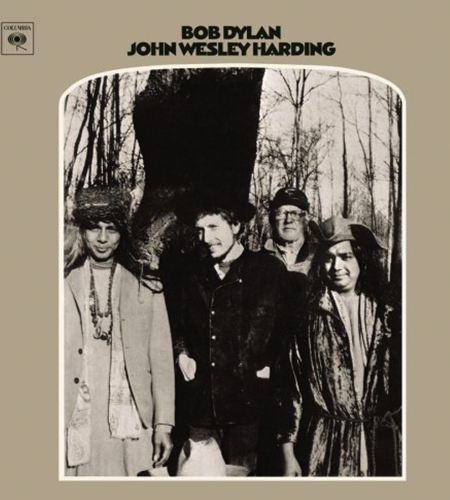
Purno Das and Lakshman Das on the cover of Bob Dylan’s album, John Wesley Harding.
(https://www.expectingrain.com/dok/who/h/hardingjohnwesley.html)
Interestingly, after a gap of decades, Sally Grossman had started to come back to Bengal to work with the Bauls in the 2000s to create their Baularchive, and so when we met Lakshman Das in 2009, he had also started the process of reconnecting with own his past. Some memories had returned to him, but in our presence too, some memories were reignited. We talked about Allen Ginsberg, who had been instrumental in connecting the bauls with the Grossmans, which kicked off their American journey in the late 1960s.
‘Allen was my friend. I taught him some asanas. When he came to our home in Suri, Baba had had a stroke and he was paralysed. He could not move at all. So I had to do everything for him. He would be drooling, and Allen cleaned his mouth with his hands.’
‘From Tarapith, Asoke brought Allen, Peter [Orlovsky], and Shakti [Chattopadhyay] to Suri, where he knew of a large clan of Bauls. There Allen found the aged Nabani Das Baul on his deathbed, half-paralyzed and unable to wander farther. Upon being introduced, the old man said of Allen and Peter, “They are born Bauls, they will spread the Baul message, and true peace, friendship and dharma will arrive.” Sitting at the old man’s bedside, Allen took down Asoke’s translation of the old man’s quavery song.
‘O blue dressed woman why don’t
You put on your blue dress again
Put vermillion on yr forehead
& come before me as a lover,
& wind and bind and plait my hairs …
I came to play the flute in Brindaban
Now I give the flute to you
young girl– …
Why don’t you take my flute
& let it sing on yr lips
Radha Radha Radha
‘A Baul is only helpless, it is said, before the sound of Krishna’s flute.’ (Deborah Baker, A Blue Hand)
Lakshman Das Baul passed on 21 April 2015. His son, Sukdeb Das Baul, who sang for us on this day in 2009, has also died. Lakshman Das Baul cared for the song to live; in our recording you can hear him introducing his sons Sukdeb and Mahadeb. Does Mahadeb continue to sing? Do his children sing with him now?
Photos from the recording session in Lakshman Das’ house in Suri, Birbhum
‘According to Purno and Laksman, their family has been baul for seven generations, but it is difficult to get more specific information from them about those generations,’ wrote Capwell. Whether to call it baul or not can be a matter of debate. What is baul, who is a baul, what it means to be of baul lineage–it is not for me to enter into this space of critical thinking, I do not have the wherewithal to do so. I do not feel much interest in pursuing such questions either. However, there is a story of love and care from father to child which we heard and saw that day in Lakshman Das Baul’ home, and let us end our session note with it. But first a prelude.
Do you remember recording at the Big Pink with Garth Hudson? Every name from that time does not ring a bell. There was a drummer named Levon Helm, you remember you rolled him a joint? Very potent it was, but then you told him about your father and how he used to mix snake head with the weed… This time Lakshman Das Baul’s voice lit up. Shaaper mathar churno, he nodded.
‘The Bauls had long black hair braided to the waist and were wearing cowboy hats they’d picked up on the drive east from California, where they’d arrived direct from Bengal. (Before heading east in a beat-up old van, they’d played the Fillmore West on a bill with the Byrds.) They loved the bubbling beer sign over our fireplace, and I played checkers with some of ‘em, and we were laughing pretty hard. I was smoking a chillum with Luxman Das, and I said, “Man, that’s some good weed.” He smiled and said, “Very good, but nothing like my father used to smoke—little hashish, little tobacco, little head of snake.” I said, “Wait a minute. Did you say ‘snake head’?” And Luxman laughed. “Yes, by golly! Chop off head of snake, chop into tiny pieces, put in chillum with little hash, little tobacco. Oh, boy! Very good—first class high!”‘ (Levon Helm , 2006, as quoted in ‘Mystic Rites for Permanent Class Conflict: The Bauls of Bengal, Revolutionary Ideology and Post-Capitalism’ by Fabrizio M. Ferrari)
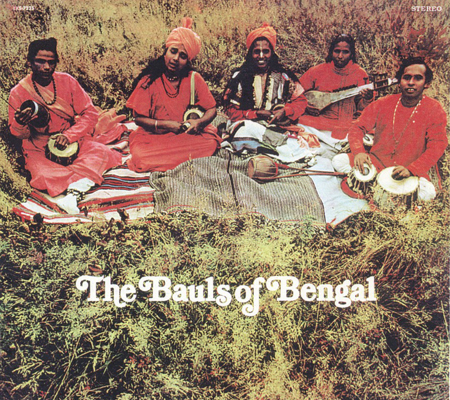
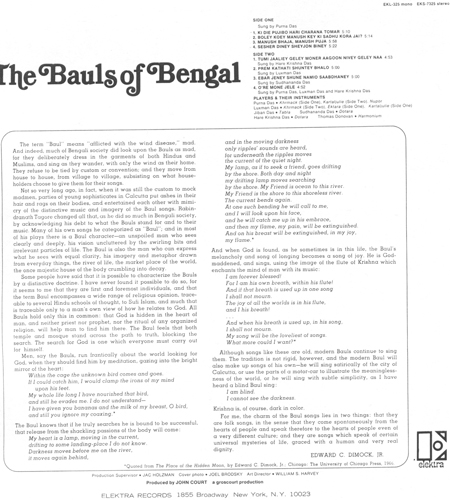
Front and back cover of ‘The Bauls of Bengal’ LP. This is one of the many records which came out of the 1967 trip.
Nabani Das Khepa Baul was a heavy smoker of weed and many have written about how he would smoke up and get into a trance while singing and dancing. By the end of his life, following his stroke, this Khepa Baul was so severely paralysed that he could not even smoke anymore, Lakshman Das told us and you can can hear it in this recording. ‘Then I would go to the market, get the ganja, prepare a chillum, take a deep drag and then breathe into Baba’s mouth. That is all that I could do. It would give him some peace.’ That image has stuck to my mind as one of resuscitation–a beautiful image of holding on, of son helping father live.
Written by Moushumi Bhowmik. Page designed by Sukanta Majumdar, Aug, 2020
Related link:
https://www.anandabazar.com/supplementary/rabibashoriyo/story-of-nabani-das-baul-father-of-purna-das-baul-article-by-moushumi-bhowmik-1.1193096 (accessed in Aug, 2020)
- Saptiguri, North Bengal. 27 November 2003. Nirmala Roy
- Bolpur, Birbhum. 25 November 2003. Nimai Chand Baul
- Kolkata. 4 September 2019. Purnadas on Nabani Das Baul
- Surma News Office, Quaker Street, East London. 27 February 2007. Ahmed Moyez
- Ambikapur, Faridpur, Bangladesh. 29 April 2006. Hajera Bibi
- Sylhet, Bangladesh. 22 April 2006. Chandrabati Roy Barman and Sushoma Das
- Sylhet, Bangladesh. 21 April 2006. Arkum Shah Mazar
- Sylhet, Bangladesh. 20-21 April 2006. Ruhi Thakur and others
- Jahajpur, Purulia. 27 February 2006. Naren Hansda and others
- Faridpur, Bangladesh. 24 January 2006. Binoy Nath
- Uttar Shobharampur, Faridpur, Bangladesh. 22 January 2006. Ibrahim Boyati
- Baotipara, Faridpur, Bangladesh. 21 January 2006. Kusumbala Mondal and others
- Kumar Nodi, Faridpur, Bangladesh. 21 January 2006. Idris Majhi and Sadek Ali
- Debicharan, Rangpur, Bangladesh 18 January 2006 Anurupa Roy & Mini Roy, Shopon Das
- Mahiganj, Rangpur, Bangladesh. 17 January 2006. Biswanath Mahanta & Digen Roy
- Chitarpur, Kotshila, Purulia. 28 November 2005. Musurabala
- Krishnai, Goalpara, Assam. 30 August 2005. Rahima Kolita
- Chandrapur,Cachar. 28 August 2005. Janmashtami
- Silchar, 25 August 2005, Barindra Das
- Kenduli,Birbhum. 14 January 2005. Fulmala Dasi
- Kenduli, Birbhum. 13 January 2005. Ashalata Mandal
- Shaspur, Birbhum. 8 January 2005. Golam Shah and sons Salam and Jamir
- Bhaddi, Purulia. 6 January 2005. Amulya Kumar, Hari Kumar
- Srimangal, Sylhet. 27 December 2004. Tea garden singers
- Sylhet, Bangladesh. 26 December 2004. Abdul Hamid
- Dhaka, Bangladesh. 24 December 2004. Ali Akbar
- Dhaka, Bangladesh. 23 December 2004. Monjila
- Changrabandha, Coochbehar. 16 December 2004. Abhay Roy
- Santiniketan, Birbhum 27 Nov 2004 Debdas Baul, Nandarani
- Tarapith, Birbhum. 14 October 2004. Kanai Das Baul


